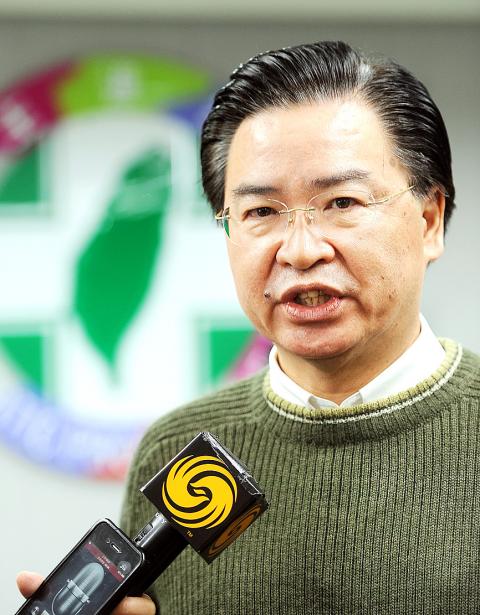Heated debate is expected in a Democratic Progressive Party (DPP) meeting tomorrow, despite it having been scheduled as an occasion for the party to finalize and unveil its “new and improved” China policy, with DPP members still arguing about the independence clause and the party’s stance on facilitating cross-strait exchanges.
The moderate wing of the party, led by former premier Frank Hsieh (謝長廷), published articles on various platforms ahead of tomorrow’s meeting — the finale of a series of seminars and expanded meetings held in the past seven months — to criticize the party’s “conservative stance” in the draft report.
The meeting drew even more attention from DPP members and political observers after DPP caucus convener Ker Chien-ming (柯建銘) proposed freezing the party’s Taiwan independence clause to reduce tensions between Beijing and the DPP, and to facilitate bilateral dialogue.

Photo: Fang Pin-chao, Taipei Times
Hsieh, who advocated “two sides, two constitutions (兩岸兩憲)” as the foundation of bilateral engagement, said in an op-ed piece published by the Chinese-language United Daily News yesterday that his initiative had been revised to the “constitutionalism consensus,” which is vastly different from his proposal.
The former premier urged the DPP to “review, integrate and summarize” the three resolutions on Taiwan’s political status — the independence clause written in 1991, the resolution on Taiwan’s future in 1999 and the resolution on a normal country in 2007 — and unify the party’s position on the highly contentuous issue.
Former DPP legislator Julian Kuo (郭正亮) lambasted the draft report, which was sent to DPP politicians for final review, saying that DPP Chairman Su Tseng-chang’s (蘇貞昌) China policy “was more conservative and unrealistic than [that of] former DPP chairperson Tsai Ing-wen (蔡英文).”
Su’s position on China was based on the 1999 resolution on Taiwan’s future, which was a “cliche,” Kuo said, adding that the DPP under Su’s leadership has been “passive” about cross-strait engagement and highlighted political confrontation.
Kuo described as “unfeasible” the DPP’s provisional conclusion of its new China policy that stressed support of human rights, freedom and a democratic movement in China, and advocated a “value-based diplomacy.”
“From what I’ve seen, the DPP still has not found the solution to replace the Chinese Nationalist Party’s [KMT] so-called ‘1992 Consensus,’ which has been accepted by Beijing as the foundation for bilateral exchanges,” Kuo said.
Responding to the criticism, the DPP’s Policy Research Committee executive director Joseph Wu (吳釗燮) said that the draft report was a summary of the consensus of previous meetings and could be revised again, if that was the consensus of those who would attend the meeting.
“We still think that freezing the independence clause is not an issue, because Taiwan is already a sovereign and independent country,” he said, adding that he was unsure if Ker would again propose freezing the clause.
Meanwhile, National Chengchi University professor Tung Cheng-yuan (童振源) and former Straits Exchange Foundation president Hung Chi-chang (洪奇昌) reportedly will announce a three-point initiative on the DPP’s China policy, which would propose freezing the independence clause and passage of a resolution that recognizes the Republic of China (ROC); establishing a non-partisan committee to promote peaceful development across the Taiwan Strait; and endorsing Hsieh’s “two sides, two constitutions” proposal.

A preclearance service to facilitate entry for people traveling to select airports in Japan would be available from Thursday next week to Feb. 25 at Taiwan Taoyuan International Airport, Taoyuan International Airport Corp (TIAC) said on Tuesday. The service was first made available to Taiwanese travelers throughout the winter vacation of 2024 and during the Lunar New Year holiday. In addition to flights to the Japanese cities of Hakodate, Asahikawa, Akita, Sendai, Niigata, Okayama, Takamatsu, Kumamoto and Kagoshima, the service would be available to travelers to Kobe and Oita. The service can be accessed by passengers of 15 flight routes operated by

GIVE AND TAKE: Blood demand continues to rise each year, while fewer young donors are available due to the nation’s falling birthrate, a doctor said Blood donors can redeem points earned from donations to obtain limited edition Formosan black bear travel mugs, the Kaohsiung Blood Center said yesterday, as it announced a goal of stocking 20,000 units of blood prior to the Lunar New Year. The last month of the lunar year is National Blood Donation Month, when local centers seek to stockpile blood for use during the Lunar New Year holiday. The blood demand in southern Taiwan — including Tainan and Kaohsiung, as well as Chiayi, Pingtung, Penghu and Taitung counties — is about 2,000 units per day, the center said. The donation campaign aims to boost

ENHANCING EFFICIENCY: The apron can accommodate 16 airplanes overnight at Taoyuan airport while work on the third runway continues, the transport minister said A new temporary overnight parking apron at Taiwan Taoyuan International Airport is to start operating on Friday next week to boost operational efficiency while the third runway is being constructed, the Ministry of Transportation and Communications said yesterday. The apron — one of the crucial projects in the construction of the third runway — can accommodate 16 aircraft overnight at the nation’s largest international airport, Minister of Transportation and Communications Chen Shih-kai (陳世凱) told reporters while inspecting the new facility yesterday morning. Aside from providing the airport operator with greater flexibility in aircraft parking during the third runway construction,

American climber Alex Honnold is to attempt a free climb of Taipei 101 today at 9am, with traffic closures around the skyscraper. To accommodate the climb attempt and filming, the Taipei Department of Transportation said traffic controls would be enforced around the Taipei 101 area. If weather conditions delay the climb, the restrictions would be pushed back to tomorrow. Traffic controls would be in place today from 7am to 11am around the Taipei 101 area, the department said. Songzhi Road would be fully closed in both directions between Songlian Road and Xinyi Road Sec 5, it said, adding that bidirectional traffic controls would